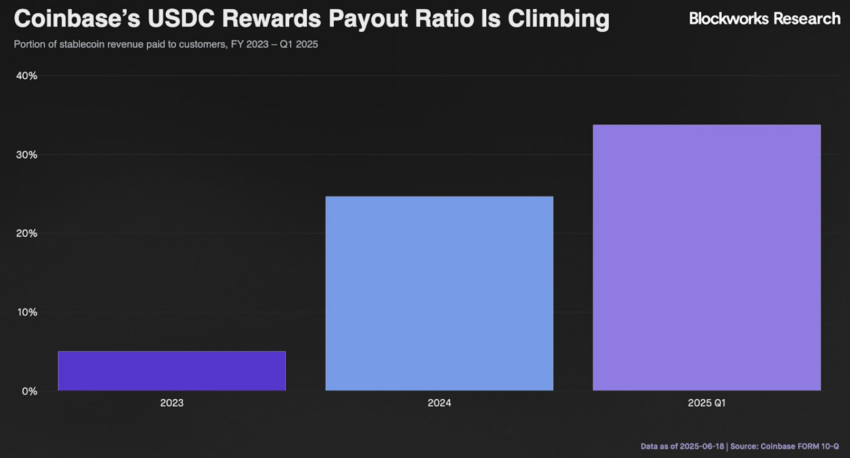Welcome to the US Cryptocurrency Morning Briefing. We'll briefly summarize today's important cryptocurrency developments.
Grab a cup of coffee and sit down. As US legislators push for new stablecoin regulations, Bitcoin veteran Max Keiser does not hesitate. He warns that stablecoins are strengthening the legal tender system that Bitcoin (BTC) was trying to destroy, rather than promoting financial freedom.
Max Keiser Warns of Anti-Bitcoin Agenda Behind US Stablecoin Bill
In a statement shared with Beincrypto, Bitcoin advocate Max Keiser raised strong criticism of stablecoins.
He warns that stablecoins undermine Bitcoin's core purpose, reinforce legal tender dominance, and support the traditional banking system.
His remarks came as the debate intensifies around the US bill, the GENIUS Act, which aims to regulate the stablecoin market. The proposed US bill will create a regulatory framework for dollar-based stablecoins.
"People who hate state-sponsored inflationary legal tender will really hate stablecoins," Keiser told Beincrypto.
The Bitcoin pioneer claims that stablecoins are often presented as an entry point to cryptocurrencies but actually serve a very different master.
"As I've been saying, stablecoins are not an entry point to Bitcoin. They were designed as an entry point to the US dollar. Empowering politicians and issuers, who are collaborating with traditional banks to fight against the slave state of self-custodial Bitcoin and legal tender," he added.
Keiser's statements align with concerns that stablecoins pegged to the US dollar are being used to sustain the existing financial order.
In a recent US cryptocurrency news publication, Max Keiser highlighted the increasing trend of stablecoin issuers using US Treasury bonds to buy Bitcoin for free. According to Beincrypto's report, Keiser said such actions could weaken government reserves and cause financial instability.
The emergence of the GENIUS Act has further highlighted these tensions. Critics argue that the bill is heavily skewed towards bank interests.
One of the most controversial aspects is a reported ban on stablecoin issuers providing interest income to users.
"The GENIUS Act draws a cruel line: Permitted or foreign stablecoin issuers cannot provide yields, interest, or rewards for token holding. This means staking, lending, farming, or 'rebasing' stablecoins are illegal. The goal? Regulators want to separate 'digital dollars' from bank-like products. Stablecoins are now cash equivalents, not investment instruments. No more 'on-chain savings accounts'. No more magic APY," said DeFi researcher Pumpius in a post.
Some analysts suggest the GENIUS Act could force competition in revenue distribution by commodifying stablecoin offerings.
This move is known to prevent high-yield stablecoins from becoming a viable savings alternative, keeping traditional banks competitive. Some see it as a direct attempt to neutralize the disruptive potential of Decentralized Finance (DeFi).
They argue that the bill aims to strengthen the power of regulated financial institutions rather than encourage innovation and economic sovereignty.
This narrative suggests that the debate about stablecoins' role in the cryptocurrency ecosystem is heating up. For Keiser, stablecoins are "disguised legal tender". Those seeking true financial freedom should turn to Bitcoin, not digital dollars.
Today's Chart

While the bill prohibits issuers from directly paying yields, this chart shows that distributors like Coinbase can provide returns through "marketing rebates".
Today's Key News
Summary of today's notable US cryptocurrency news:
- Cryptocurrency inflows reached $1.2 billion for 10 consecutive weeks. Despite geopolitical tensions.
- OKX is exploring an IPO in the United States. After recently re-entering the market with a new headquarters and leadership.
- Jerome Powell's testimony on June 24 could impact Bitcoin volatility. Depending on the Fed's stance on inflation and interest rates.
- Cadon Capital added approximately 1,000 BTC to its corporate balance sheet. Meanwhile, Metaplanet now holds over 11,000 BTC and is accelerating its cryptocurrency-backed financial policy.
- Spot Bitcoin ETF recorded inflows of $1.02 billion last week. Decreasing by 29% from the previous week as investor interest wanes.
- Analysts note that Raoul Pal and Arthur Hayes point to macro trends and monetary policy as key indicators for Bitcoin's rise.
- Iran's potential retaliation against the US could cause a significant Bitcoin price drop, including recently closing the Strait of Hormuz. Analysts predict a 20% decline.
- Cryptocurrency whales are experiencing major gains and losses as Israel-Iran tensions shake the market.
- Pi2Day on June 28 may reveal major developments. Raising community excitement, including potential connections between Pi Network and GenAI.
- Analysts expect Bitcoin's dominance to approach 71%. This could precede another sharp adjustment of altcoins, similar to what was seen in February 2025.
Cryptocurrency Stock Market Overview
| Company | Closed on June 20 | Market Overview |
| MicroStrategy (MSTR) | $369.70 | $363.70 (-1.62%) |
| Coinbase Global (COIN) | $308.38 | $300.71 (-2.49%) |
| Galaxy Digital Holdings (GLXY) | $18.86 | $18.95 (+0.48%) |
| Marathon Holdings (MARA) | $14.32 | $14.04 (-1.96%) |
| Riot Platform (RIOT) | $9.56 | $9.41 (-1.56%) |
| Core Scientific (CORZ) | $11.86 | $11.84 (-0.17%) |







